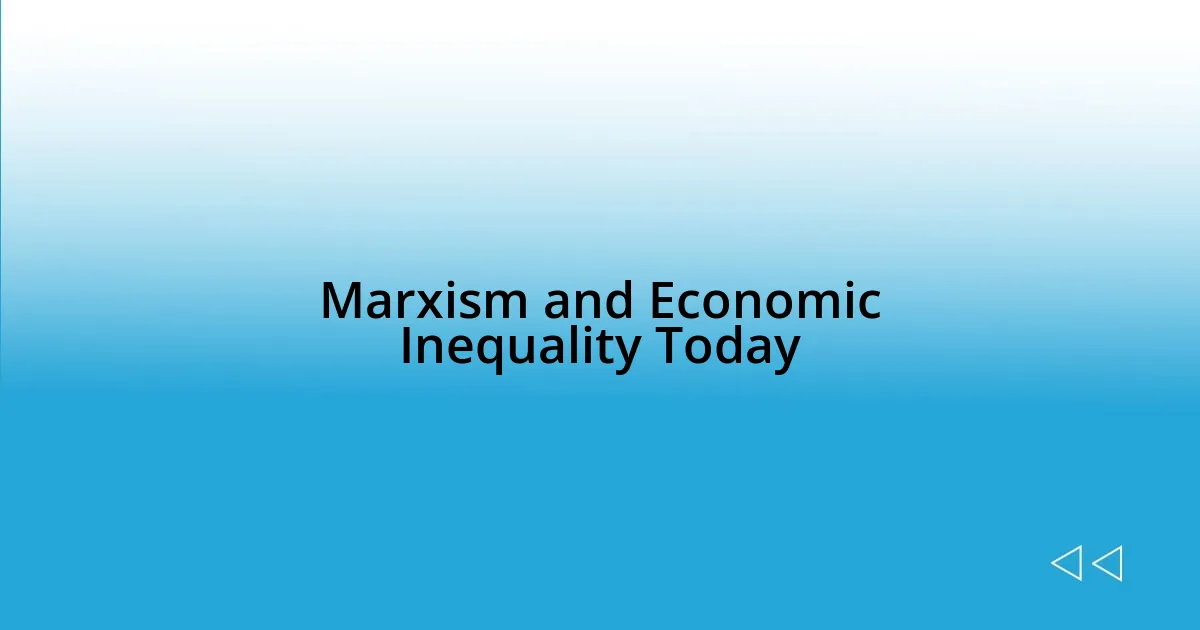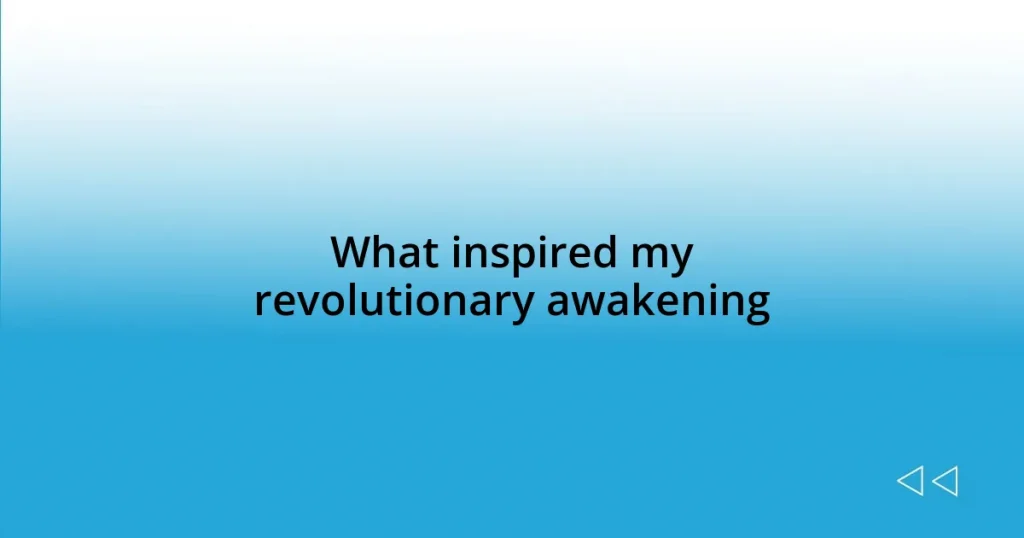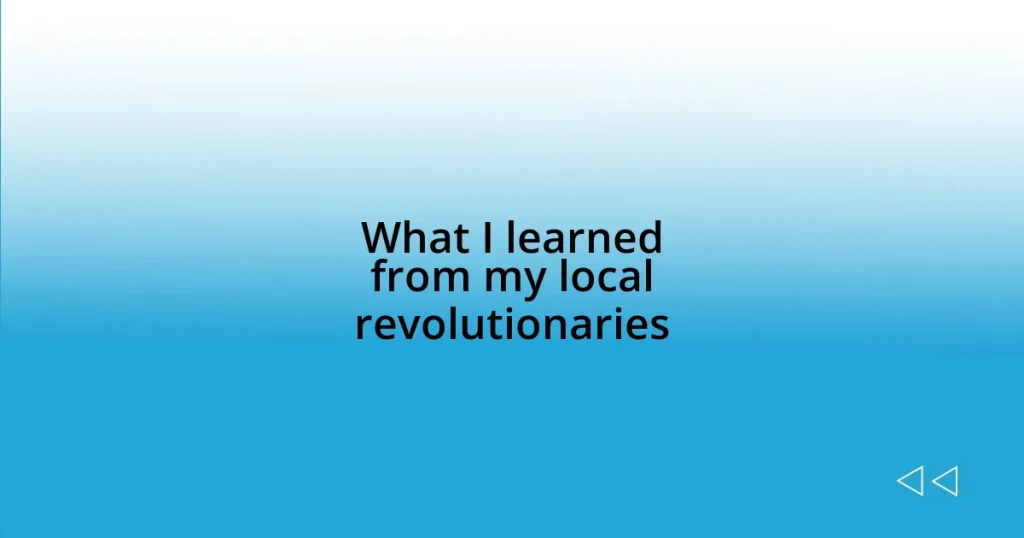Key takeaways:
- Marx’s analysis of capitalism highlights the ongoing relevance of class struggle, inequality, and worker alienation in today’s gig economy.
- Key Marxist concepts such as historical materialism, surplus value, and revolution resonate with current social movements demanding fair wages and systemic change.
- Modern expressions of culture, including art and literature, reflect Marxist critiques of power dynamics and economic exploitation, serving as both a mirror and a catalyst for societal change.

Understanding Marx’s Historical Context
Marx wrote during a time of profound industrial change and economic turmoil in the 19th century. I often think about how the factories were churning out goods while the workers were barely scraping by. Has there ever been a moment in history where the gap between the rich and poor feels as stark? For Marx, the struggles of workers against oppressive conditions were not just theoretical; they were lived experiences.
As I dove deeper into Marx’s writings, I marveled at how he analyzed capitalism, seeing it as a system that inherently leads to inequality and alienation. It’s like he had an uncanny foresight into today’s gig economy, where many hustle for survival without any safety nets. I wonder, do we truly grasp the implications of this? The social injustices he described resonate today, making it clear that his insights extend beyond his time.
Reflecting on Marx’s context, I can’t help but feel a sense of urgency in understanding his critiques. Living in a world that’s still grappling with these economic disparities makes his work feel incredibly relevant. The emotional weight of those experiences he shared—the despair of the working class, the greed of the bourgeoisie—echoes in today’s news. Isn’t it fascinating how his observations prompt us to question our own society?

Key Concepts of Marxism Explained
As I navigated through the key concepts of Marxism, I found myself particularly struck by the idea of class struggle. Marx argued that history is essentially a history of conflicts between different social classes, primarily the bourgeoisie (the owners of production) and the proletariat (the working class). This struggle shapes societies and drives historical change, and I can’t help but feel a certain heaviness when I recall the conversations I’ve had with friends who are fighting just to make ends meet. It makes me wonder how we can ignore the echoes of this struggle in our own lives.
Here are some fundamental concepts of Marxism that I believe outline his critique of society:
-
Historical Materialism: This theory suggests that material conditions and economic factors drive societal development. It’s fascinating to consider how our current economic framework influences cultural and social dynamics.
-
Alienation: Marx described how workers become disconnected from the products of their labor, the process of work, and their own essence as humans. There was a time in my own career where I felt this disconnect, making me yearn for more meaningful work.
-
Surplus Value: This concept highlights how workers are paid less than the value they create, leading to profits for the capitalists. Reflecting on this, it really makes me reconsider the fairness of wages in relation to the cost of living today.
-
Revolution: Marx believed that a revolutionary change was essential for the proletariat to overthrow the bourgeoisie. I often feel this revolutionary spirit bubbling beneath the surface in various social movements, nudging us to rethink the status quo.
These concepts, deeply rooted in the experiences of workers and economic systems, resonate strongly in my personal reflections on today’s society. They compel me to question not only the systems in place but also my role within them. Isn’t it intriguing how a theory formed in the 1800s continues to challenge our modern ideals?

Marxism and Economic Inequality Today
Understanding the gravity of economic inequality today often brings me back to Marx’s predictions about capitalism’s outcomes. As I reflect on my own experiences, I can’t shake the feeling that the widening wealth gap is no accident; it’s a direct result of a system that privileges the few while leaving the masses struggling. I remember a conversation with a friend who works two jobs just to afford basic bills. This reality mirrors Marx’s assertion that the rich get richer at the expense of the working class.
When I explore the idea of economic inequality through a Marxist lens, I’m struck by how the principles he laid down are evident in today’s society. The tech industry, for instance, has created immense wealth for a select few while gig workers hustle without benefits or job security. My own journey in the freelance world has often mirrored this struggle, reminding me of Marx’s warning about alienation. Every time I stress over inconsistent paychecks, I feel that disconnect he’s described, where my labor doesn’t truly reflect its value.
The urgency of addressing economic inequality has never felt more palpable. I regularly find myself questioning whether modern capitalism can genuinely be reformed. Are we doomed to repeat the mistakes of the past, or can we learn from them? I’ve often spoken with like-minded individuals about how, amidst the chaos of economic disparity, there seems to be a growing awareness and a call for action—echoing Marx’s revolutionary spirit that still resonates in today’s social movements.
| Key Concepts | Modern Examples |
|---|---|
| Class Struggle | The fight for fair wages and workers’ rights is alive today, with movements like Fight for $15. |
| Alienation | Freelancers and gig workers experience this daily as they navigate job instability and lack of benefits. |
| Surplus Value | Many workers are underpaid for the high value their contributions bring, reflecting in ongoing debates about minimum wage. |
| Revolution | Social justice movements today, advocating for systemic change, embody Marx’s notion of revolution. |

Rediscovering Marx’s Influence on Culture
Rediscovering Marx’s influence on culture reveals striking parallels even in contemporary art and literature. I’ve often found myself engrossed in films or books that echo Marxist themes of power dynamics and societal conflict. For instance, I remember watching a film that explored the plight of a factory worker, and I couldn’t shake the feeling that it was not just a story but a reflection of our ongoing struggle against exploitation. Isn’t it fascinating how storytelling can serve as a mirror to the social issues that persist today?
Moreover, cultural movements like street art often encapsulate a Marxist critique. I vividly recall walking through urban spaces adorned with murals that highlighted economic struggles and called for social justice. Each piece of art felt like a rallying cry, urging a collective awakening to the harsh realities of capitalistic exploitation. It’s moments like these that make me ponder: can art not only express discontent but also inspire change in our societies?
Engaging with Marx’s ideas can shift our perspectives in unexpected ways. For example, when I discuss his theories with friends, I’m often surprised by how passionately they connect these concepts to their own experiences with societal structures. The conversations often drift into how culture serves both as a reflection and a catalyst for change. It feels as though we are part of an evolving narrative where Marx’s insights continue to resonate, pushing us to challenge and redefine our cultural landscape.
















